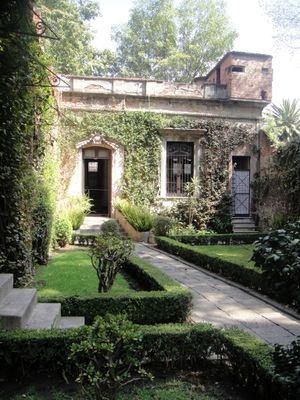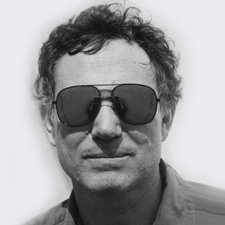The Death Of Trotsky
| Series | |
|---|---|
| WBAI And NPR Playhouse | |
| Original Broadcast Date | |
| 1979 | |
| Cast | |
| Joe Frank | |
| Format | |
| 1 hour | |
| Chronology | |
| Preceded by: | Arena |
| Followed by: | Til You're Gone |
The bus leaves in the evening from the Buena Vista station, crosses 27 bridges to the valley of the crumbs.
The Death Of Trotsky is the name of a program Joe Frank produced as part of the series WBAI And NPR Playhouse. It was originally broadcast in 1979.

Synopsis
Spring Is Here (Wendy Waldman)
0:30: 'The bus leaves in the evening…' Joe describes what he sees on a bus ride from Mexico City, ends with, 'I'll take you to the prison, to the fortress on the hillside, where the martyrs of the movement gaze out into the plain, scarlet blossoms warm and bleeding, falling in the courtyard, are gathered by the wind and washed by the rain and the nails are for the body and the body for the tree and the tree is deeply rooted at the bottom of the sea.' [1]
1:30: Solea (Miles Davis)
2:10: Joe tells a fictionalized account of Trotsky's assassination, beginning with the assassin's arrival by ship in Vera Cruz. He calls the assassin 'Jackson Mornard'. [2]
8: 'The nausea never leaves...' Joe tells receiving radiation treatment. [3]
9:10: Joe visits the grave of his father in Barcelona. [4] Joe imagines being buried.
11:50: Mornard makes the acquaintance of Trotsky's personal secretary, Sylvia Adelman. [5]
20:20: Joe recites the 'nada' poem from Hemingway's A Clean well lighted place.
21:10: Joe goes to his therapist; Joe fears nothingness; the therapist tells him he thinks too much; Joe recites the 'nada' poem again. The therapist then takes off on Macbeth's 'Tomorrow, and tomorrow, and tomorrow' soliloquy [6] and complains of how badly therapists are treated.
24:35: Mornard gains the confidence of those around Trotsky while losing confidence in his mission.
28:30: Joe tells us about (Søren) Kierkegaard [7] and the dilemma of whether he should marry the woman he loves.[8] He works out to develop the strength to make the necessary leap of faith to believe in God. It fails.
31:30: Trotsky's guards get used to Mornard from his daily trips to bring Sylvia.[9]
39: Mornard kills Trotsky.
41:10: 'I'll take you to the prison, to the fortress on the hillside, where the martyrs…'
42:10: Joe wants to believe in something beyond himself and his loved ones; sometimes he feels the need to pray.
42:40: Joe goes to the golf club with his grandfather, a survivor of the Holocaust. [10] They both play poorly.
43:50: Joe sees a small building that looks like a ruined temple. He goes in, sees his grandfather, who thinks he's pregnant.
45: Mornard is convicted, given 20 years.[11]
46: Toccata, Adagio, and Fugue C major BWV 564, JS Bach.
46:40: Joe says all the accused in the Soviet show trials 1936-8 confessed. [12] Joe talks about the value of confession, that we have a compulsion for it greater than any other, because we all want redemption. [13]
48:40: Mornard did not confess.
48:50: Mariachi music.
49:10: Dostoevsky once said that if God didn't exist, everything would be possible. Joe attributes Nazi Germany's nihilism to this, quotes a letter Camus wrote to a German friend that concludes, 'human beings created by their very despair at their not existing'. [14]
50:10: God does not exist. Joe attributes his death to Nietzsche, says he was arrested for the murder, put under the care of Jung… eventually Freud gets invoked.
53: Joe tells of Mornard leading a small band of soldiers on their way to join the revolution, gets lost. They find an underground printing press, discover the revolution has succeeded but the new government is even more corrupt than the last.
55:00: Mornard recalls his arrival in Mexico 20 years ago, all he had done.
55:40: Mornard arrests the printers, has them take him to the imperial city, where they are celebrated.
56:40: Their bus loses its way, the driver, having cataracts and lost his maps, had been relying on a guide dog.
57:30: 'I'll take you to the prison, to the fortress on the hillside, where the martyrs…'
- Fictionalized, third-person account of Trotsky's assassin, cut with assorted other events.
- Joe reads a poem.
- First person scenes from a hospital, a cemetery.
- Stalin is Trotsky in disguise.
- Prayers full of Nada. Being afraid of nothing.
- The problems of analysts.
- Toes engaged in a discussion of socialism, a woman lays an egg, a bird becomes a war plane.
- Kierkegaard regrets the decision not to marry, is taunted by children shouting "Either, Or," make a leap of faith before an audience.
- Trotsky is serenaded by a terrible orchestra.
- A holy man is buried for forty days.
- Falling asleep while killing Trotsky.
- A pregnant old man in a golf course.
- The power of confession.
- Nihilism; Nietzsche is accused of killing god; Freud treats a kleptomaniac; the future determines the past.
- Trotsky's killer leads a revolutionary cadre into the woods, becomes lost, discovers that their side has already won and become corrupt, and captures dissidents.
Interesting Facts
- The nada prayer appears in Ernest Hemingway's short story "A Clean Well Lighted Place"
Music
- "Spring Is Here" - Wendy Waldman (from Wendy Waldman, 1975)
- "Xibaba" - Donald Byrd (from Electric Byrd, 1970)
- "Ay Jalisco No Te Rajas" - Mariachi Miguel Dias (from Fiesta En Mexico, 1956)
- "Toccata, Adagio, and Fugue in C Major, BWV 564: Fugue" - J. S. Bach (from Bach Organ Favorites, Volume 2 performed by E. Power Biggs, 1965)
Commentary
Please see guidelines on commentary and share your personal thoughts in this section.
External Links
Footnotes
- ↑ Joe re-uses this again at 41:10 and the end. I don't know what it means.
- ↑ Trotsky's assassin, Ramón Mercader, had used the pseudonyms 'Jacques Mornard' (son of a Belgian diplomat) and 'Frank Jackson' (a Canadian engineer) on this mission, was sometimes referred to as 'Mornard-Jackson', a double last name, retrospectively, so as to make sure everybody knew whom they were talking about.
https://oncubanews.com/en/world/ramon-mercader-mission-of-silence/
https://en.wikipedia.org/wiki/Ram%C3%B3n_Mercader
I recommend visiting Trotsky's house in Mexico City when you're in town. It's a museum of sorts; the chipped spots made by gunfire have been left. - ↑ This could have been like the treatment for testicular cancer Joe had in his 20s.
- ↑ Mercader was born in Barcelona.
- ↑ Mercader got into a relationship with a Trotskyite New Yorker, Sylvia Ageloff, whose sister Rita was one of Trotsky's personal secretaries in Mexico City, through whom he hoped to get to Trotsky.
- ↑ which Joe quoted at the end of Tomorrow
- ↑ the 19th-century Danish philosopher. Among other books, he wrote Either/or, was the source of the title for that episode of Joe's shows. He's also mentioned in At The Border, Mystery, and Bitter Pill
- ↑ This was a significant dilemma for Kierkegaard.
- ↑ This is like what Mercader did.
- ↑ Fictional; Joe's mother's father died in 1936; his biological father's father must have been long dead; his stepfather's father was an American.
- ↑ This was Mercader's sentence. He survived and returned to the Soviet Union, lived there and Cuba until his death in 1978.
- ↑ True, I think. Koestler's Darkness at noon captures the psychology of this.
- ↑ The President rehearses this notion in Tour Of The City, A (Part 1); Vorst does in Nightride.
- ↑ I can't find this quote, don't think it sounds like Camus, but more like Sartre.
